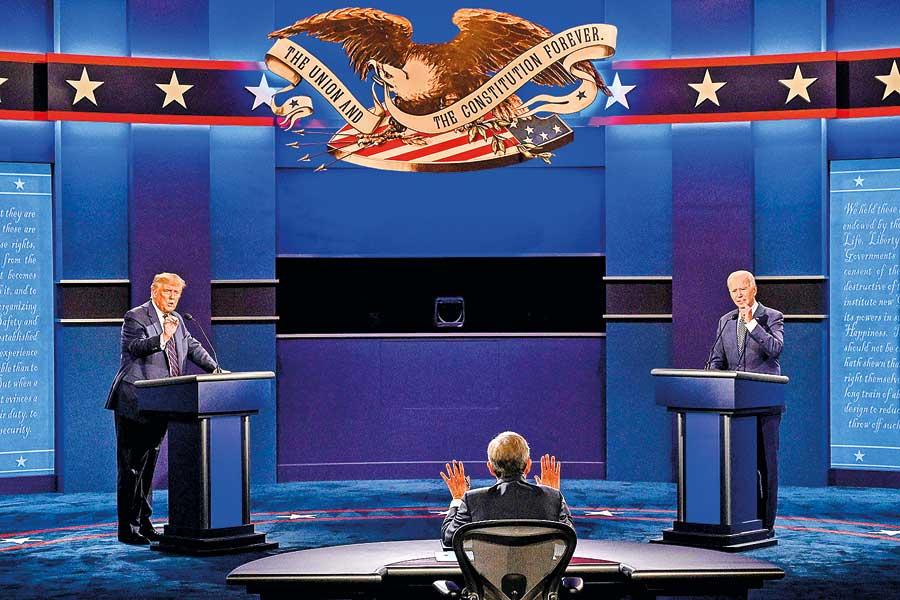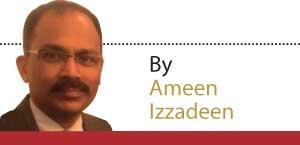Debate or debacle, democracy dazzles
2 October 2020 12:02 am Views - 494

US President Donald Trump and Democratic Presidential candidate and former US Vice President Joe Biden exchange arguments as moderator and Fox News anchor Chris Wallace (C) raises his hands to stop them during the first presidential debate at Case Western Reserve University and Cleveland Clinic in Cleveland, Ohio, on September 29. AFP
True democracy is progressively dynamic. It is healthy if it keeps improving; sick if it deteriorates. A healthy democracy entails a political system where citizens have the right to choose or 
But much more can and should be done to make democracy stronger and healthier in a democratic nation’s march towards high levels of political development. For the level of development of any nation cannot be measured by economic indicators alone. Rather, it needs to be assessed also by a nation’s social, cultural, political and moral progress. Political debates indeed are an indicator of a high level of political development in a state. They certainly contribute towards the health of a democracy. Advanced democracies such as the United States, Canada, Britain, Australia and Germany have made it a key feature of their political process, while some developing nations such as Chile, Argentina and Mexico also conduct leaders’ debates during elections. In Asia, the only two countries that have adopted this democracy-promoting feature are Iran and the Philippines.
In the United States, a presidential election is preceded by a series of live televised debates between the candidates representing the two main parties – the Democratic Party and the Republican Party. The debates are sponsored by the Commission on Presidential Debates (CPD), a nonprofit corporation established by the two parties in 1987. Prior to that, debates were not a regular feature in US politics. It was during the 1960 campaign that the first televised debate was held between Richard Nixon and John F Kennedy. That no television channel is allowed to squeeze in commercials during the debate is a clear message that democracy is not for sale.
On Tuesday, a fresh wind of democracy blew across the US, when President Donald Trump took on Democratic Party candidate Joe Biden in the first of the three presidential debates, a mechanism that compels or requires the candidates to come clean and provide candid answers to public queries.
Adding more strength to the debate-driven democratic discourse is the free media culture of the US. Despite the negative influence of the agenda-driven Corporate Media, most US journalists and political analysts are known to be expressing their views without fear or favour.
It was indeed journalism at its best when neither candidate was spared on Tuesday during the post-debate media discussion which included fact checks and public reaction. No sooner the debate ended than CNN’s veteran anchor Wolf Blitzer slammed it as a disgrace and the “most chaotic” debate he’d ever seen. In its fact-check segment, a CNN research journalist accused Trump of unleashing an avalanche of repeat lies on topics such as voting by mail, medicare and the coronavirus pandemic.
If moderated in a professional manner devoid of bias and prejudice, political debates are a people’s court where the burden of proof is on the candidate aspiring to be vested with the people’s power to govern the nation for a limited term in accordance with rules and fundamental democratic values.
Tuesday’s US presidential debate had the two candidates answer the main crises the US is now facing – the pandemic, affordable healthcare, the economy, race relations and the appointment of a Supreme Court judge, although moderator Chris Wallace, a Fox News veteran, came in for sharp criticism for his poor refereeing when Trump kept on interrupting Biden in violation of the debate rules.
CNN’s Blitzer said that although he could not say who won the chaotic debate, he could say the American people had lost. His lament underlines concerns not only over the gutter level to which Trump has taken the debates, but also over democracy’s decline under the Trump administration. In the world democracy index, the US, placed 25th, is labelled as a flawed democracy and lumped together with developing nations such as Sri Lanka, placed 69th.
In Sri Lanka, however, most politicians fight shy of debates during election campaigns. Perhaps, our politicians avoid debates as they have no answer to the people’s questions. Or they may not be able to give an intelligent answer, if they are asked to explain the economics of their campaign promises such as million houses, million jobs, free fertiliser, and free this and free that.
If we had a presidential or prime-ministerial debate in the run-up to the recent elections, there could have been more clarity on constitutional amendments and the people could have taken an informed decision when voting. It is sheer deception if claims are made that all those who voted the present government into office did so to enable the President to usurp more powers, take the country towards authoritarianism and subvert checks-and-balances mechanisms through parliament and the judiciary. Far from it, the people did not give a mandate to demolish democracy.
Like the people of the United States, Sri Lankans want to hold their leaders accountable for their omissions and commissions. They need answers with regard to national security, economic development, ethnic reconciliation and power devolution, among other matters. The government’s response to most of these issues lacks clarity. After Tuesday’s US presidential debate, the people got to know that Trump sympathises with alt-right groups as his “Proud Boys, stand back and standby” remark suggests and that he is not going to accept the November 3 election results without a fight if he loses.
As moderator Wallace believes that despite the acrimony, the debate still offered viewers plenty of insights about the two candidates. “I think debates are about revealing what [the candidates] think. You certainly gained an insight into Donald Trump and what he’s thinking and where he wants to take the country and how he wants to take the country there. To that degree I thought it was a success. It may not have been pretty, but it was revealing.”
He was spot on. This is why a democracy worth its salt must have the leaders’ debate as a permanent feature of any key election.
In Sri Lanka, we could have been spared the worries and anxieties of the fate of democracy, had the candidates taken part in a debate. It could have given us an insight into their agendas. Besides, it certainly would have established a culture of accountability regarding campaign promises. Shall we hope against hope that at the 2025 presidential election, the candidates will have the courage to face at least a one-off political debate moderated by a journalist or a panel of journalists who are not sycophants?